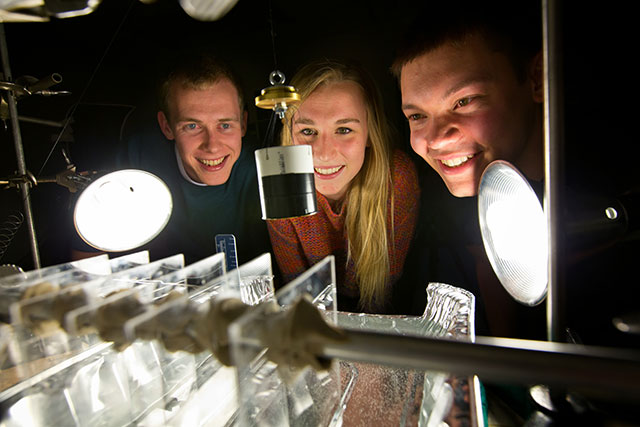Page 140 • (4,880 results in 0.06 seconds)
-
Namibia’s capital city. One of them continues to teach as originally planned, the other took a slightly different path. Both credit Namibia for the direction of their vocation. And they aren’t alone. Many students carry lifelong lessons with them after returning from Windhoek, says Jan Weiss, assistant professor of education. An educational relationship that started with a grant-funded teacher training program involving PLU faculty members has evolved into a deeply immersive experience for PLU students
-

Paula Leitz, associate professor of education. “Capstones at PLU engage students in focusing their total PLU education into a focused area. It is not just a culminating activity – it is an opportunity to rethink and refine one’s personal reflection on the result of four years of intellectual engagement at PLU,” Leitz said. “Faculty are a significant part of this process as they lend their expertise and provide individualized support to students.” Nevis Granum ’13 exhibits some of his photographs as
-
Powell-Heller Conference for Holocaust Education“Africa and the Holocaust”Keynote SpeakersFree and Open to the Public - Registration RequiredSchedule“Sub-Saharan Africans and the Holocaust”Keynote Speaker: Dr. Edward KissiWednesday. October 25th7:00 p.m. – Keynote (Regency Room, AUC)Education B.A. (History, Classics) University of Ghana, 1987; M.A. (History) Wilfrid Laurier University, CANADA, 1991; Ph.D. (History) Concordia University, Montreal, CANADA, 1997. Biography Edward Kissi is
-
and its history. Hispanic and Latino peoples have also been excluded from national parks and the NPS history; there are multiple parks on the lands of former Spanish mission sites. These stories of exclusion were born from a history of colonization and “othering” in the United States which has contributed to promoting an Anglo-American definition of wilderness which continues to create exclusion in the parks today. By analyzing various primary and secondary sources from the perspective of and
-
performances. In funeral services, masks act as witnesses for the ancestors ensuring that proper burial rites are being observed. In this capacity, they do not perform or dance. They accompany the body from the funeral to the burial location occupying a secondary role in the ritual. However, they do perform during an annual memorial for those that died during the past year. They dance to music made by whistles (wiré) and long wooden drums (gangaado). When they are not being used in public ceremony, masks
-
characteristics of the spirit. The spirit of Sowei represents the ideals and authority of the society, and is understood as the Sande society’s teacher, healer, and judge (Boone 36). Senior officials of the Sande also adopt specific roles when wearing these costumes; some frighten the audience while others serve as comic relief in the ceremony. Even though the masks are worn exclusively by women, they are carved by male artists. The sowei mask is made out of wood and finished in a monochrome black color made
-
characteristics of the spirit. The spirit of Sowei represents the ideals and authority of the society, and is understood as the Sande society’s teacher, healer, and judge (Boone 36). Senior officials of the Sande also adopt specific roles when wearing these costumes; some frighten the audience while others serve as comic relief in the ceremony. Even though the masks are worn exclusively by women, they are carved by male artists. The sowei mask is made out of wood and finished in a monochrome black color made
-
characteristics of the spirit. The spirit of Sowei represents the ideals and authority of the society, and is understood as the Sande society’s teacher, healer, and judge (Boone 36). Senior officials of the Sande also adopt specific roles when wearing these costumes; some frighten the audience while others serve as comic relief in the ceremony. Even though the masks are worn exclusively by women, they are carved by male artists. The sowei mask is made out of wood and finished in a monochrome black color made
-
realized I was sitting in a classroom with my first openly queer teacher (in my entire life!). There was never any secrecy, and to know Beth is to know the type of pure sincerity and openness that comes when someone treats each person they meet as a peer. I am endlessly grateful that my years at PLU overlapped with the end of Beth’s tenure, because I know I am a better student, historian, and person for it. Thank you to Beth and the other interviewees—Brian, Colleen, Pastor Jen, Nikki, Katie, and Emily
-
circling toward a career in writing, prioritizing the task more and more each year. She credits the Rainier Writing Workshop’s assistant director, Judith Kitchen, with giving her the courage and confidence to take the plunge. “Judith Kitchen is entirely to blame for all of this,” Andrews laughed. “It’s Judith, all Judith. There are tons of people who would say the same thing. Judith is an entirely generous and encouraging teacher of writing … I’m her groupie.” Andrews isn’t the only current student to
Do you have any feedback for us? If so, feel free to use our Feedback Form.


